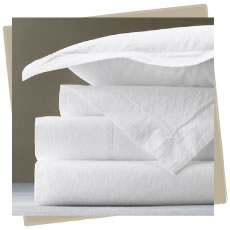
How nice is it to enter in a bed with the sheets just changed, especially after a harrowing day? The perception of the clean, softness and freshness of the sheets undoubtedly helps you sleep better.
But is it only a matter of the senses? Well, It is actually much more.
If you were sleeping in the bed with sheets in use for more than a week you would surely realize it. Irritated skin, stuffy nose, sneezing, coughing, asthma: these are some of the symptoms related to a change not quite frequent of your bedding.
But specifically, how often should we change the sheets? And who decides that?
So as we were taught by our grandmothers, the sheets should be changed at least once a week and in summer, due to increased sweating, even two.
It might seem pretty obvious, but it is not, actually. Some people also leave them there for a month or as others , like the English, referred by researches, the change occur three times a year, keeping in their bed dust and mites invisible to naked eyes but still present.

Why is it important to change the bedsheets regularly?
The bed is the perfect habitat of mites. These "nice friends" feed themselves with our skin, which inevitably remains in the sheets in tiny flakes and, in particular, in the pillows.
Dust, bacteria and pollen also like to settle on the fabric of our bed,which instead of embracing your dreams, it becomes the worst enemy for your skin, for your breathing and your rest.
To all this are added human secretions (sweat etc.), hair, creams, and sometimes food remains: all contribute negatively to the hygiene of your sheets and therefore causing allergies, asthma, itching, disturbed sleep.
Changing the sheets regularly is so important because, if on one hand the hours of sleep are more pleasant, on the other hand your health benefits, as well.

How to fight mites?
To avoid the constant development of mites, we must pay close attention to the amount of humidity in the air. If you live in a territory or in a moisture-rich home, the best thing to do is to purchase a dehumidifier and place it in the bedroom. This choice should slow down the formation of dust mites on bedding, mattress and blankets.
Moreover, it would be appropriate to keep the sheets as clean as possible by following some simple rules.
Eg:
- • take a good shower before going to bed
- • wear clean pajamas and night gowns;
- • do not lie down with damp or hair soaked of gels or foams;
- • do not eat on the bed (the bed should not replace the dining table!);
- • do not go to bed with your worn clothes (it may seem obvious but it is not at all, often we say: "I was so tired that I went to bed dressed."... Imagine what we could carry in the bed in question, the clothes have been in contact with the outside for all day!).

How should the sheets be washed?
The sheets and pillowcases should be washed separately from the rest of the laundry and at a temperature of at least 50 ° - 60 °. A good antibacterial is always recommended, especially if you have children and if you suspect the presence of mites.
Once washed, the sheets should be spread out and dried in the sun in a well ventilated place. Careful drying and remember to take the sheets only when they are completely dry! Putting the damp clothes in the closet, does nothing more than provide a perfect environment to the proliferation of mites. The microorganisms tend to survive even after the washing and the drying only eliminate them for some time.
Once well dried and ironed, the sheets should be stored in clean closets without dust.
When, in late winter , you change your wardrobe, you should store quilts, blankets and winter bedding in vacuum bags.
